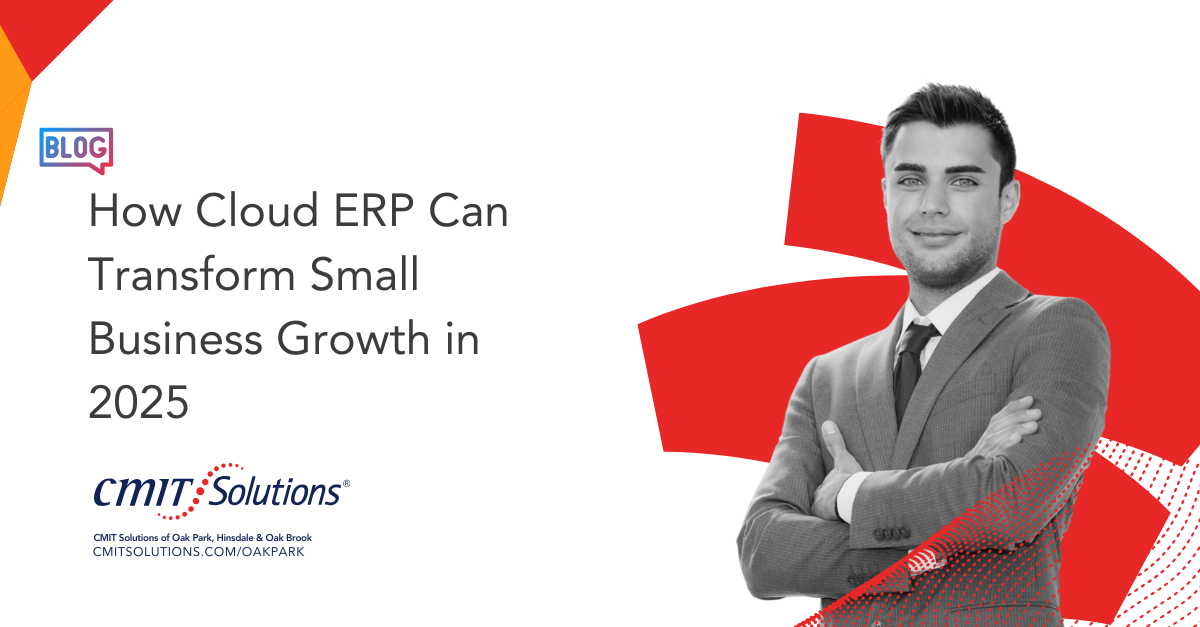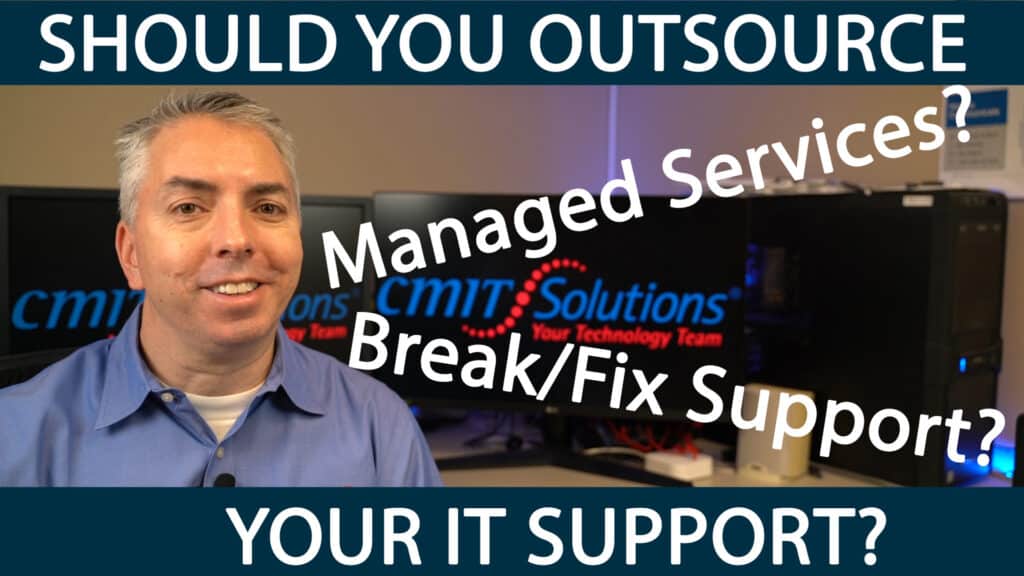Cloud computing has revolutionized how businesses manage their operations, and one of the most impactful advancements in this area is Cloud ERP (Enterprise Resource Planning). Small businesses are increasingly adopting Cloud ERP solutions to streamline their processes, improve efficiency, and scale their operations without the heavy upfront investment that traditional ERP systems require.
At CMIT Solutions of Oak Park, Hinsdale & Oak Brook, we specialize in helping businesses transition to modern IT solutions that enhance productivity, reduce costs, and improve security. With our expertise in Managed IT Services, small businesses can leverage Cloud ERP to achieve operational excellence and long-term sustainability.
As technology continues to evolve, Cloud ERP is becoming a necessity rather than a luxury for small businesses. This article explores how Cloud ERP will transform small business growth in 2025, the benefits it offers, and how businesses can implement it effectively.
What is Cloud ERP and Why is it Important?
Cloud ERP is an integrated software solution that helps businesses manage core functions such as finance, human resources, supply chain, sales, and customer relationship management. Unlike traditional ERP systems that require on-premise servers and significant IT resources, Cloud ERP is hosted on secure cloud platforms, enabling businesses to access real-time data, automate tasks, and improve decision-making from any location.
Key Benefits of Cloud ERP for Small Businesses
- Cost Savings – Eliminates the need for expensive hardware, on-premise servers, and IT maintenance costs.
- Scalability – Businesses can easily add new features, users, and integrations as they grow.
- Enhanced Security – Cloud ERP providers offer advanced security measures, including data encryption, multi-factor authentication, and automated backups.
- Accessibility and Collaboration – Employees can access the system remotely, promoting efficiency and collaboration.
- Automatic Updates – Cloud ERP systems receive automatic software updates, ensuring businesses always have the latest security patches and features.
With Cloud Services, small businesses can adopt Cloud ERP without the complexity and risks associated with on-premise deployments.
How Cloud ERP Supports Small Business Growth
1. Automating Business Processes for Increased Efficiency
Manual processes slow down operations, leading to errors and inefficiencies. Cloud ERP automates key business functions such as accounting, inventory management, and payroll, enabling small businesses to reduce administrative workload and improve accuracy.
By integrating Cloud ERP with IT Support Services, businesses can automate workflows and ensure seamless connectivity between departments.
2. Improving Financial Management and Decision-Making
Managing finances is a challenge for many small businesses. Cloud ERP provides real-time financial insights, allowing businesses to track expenses, monitor cash flow, and generate accurate reports.
With IT Compliance, companies can maintain financial accuracy while ensuring compliance with tax regulations and reporting requirements.
3. Enhancing Cybersecurity and Data Protection
Security is a major concern for small businesses, especially when handling customer data, financial records, and confidential business information. Cloud ERP solutions come with built-in cybersecurity measures, such as data encryption, user authentication, and backup recovery options.
With Cybersecurity Solutions, businesses can implement multi-layered security strategies that protect against cyber threats.
4. Supporting Remote Work and Business Flexibility
The shift toward remote and hybrid work models requires businesses to have cloud-based solutions that enable employees to work from anywhere. Cloud ERP ensures that teams can collaborate in real-time, access critical data remotely, and maintain operational continuity.
With Remote IT Support, businesses can maintain secure, remote access to their ERP systems without compromising security or performance.
5. Optimizing Inventory and Supply Chain Management
Cloud ERP helps small businesses gain visibility into their supply chains, optimize inventory levels, and improve supplier management. Businesses can track inventory in real-time, reducing stockouts, overstocking, and inefficiencies.
With Network Management, businesses can integrate inventory data across multiple locations for better decision-making.
6. Reducing IT Overhead and Maintenance Costs
On-premise ERP systems require constant maintenance, updates, and IT support, which can be costly for small businesses. Cloud ERP eliminates the need for in-house IT infrastructure, reducing overhead expenses.
By leveraging Outsourced IT Support, businesses can focus on growth while IT experts handle system maintenance and security.
How to Implement Cloud ERP Successfully
Step 1: Define Business Objectives
Before choosing a Cloud ERP solution, businesses must identify their key challenges and objectives, such as automating accounting, improving inventory tracking, or enhancing cybersecurity.
Step 2: Choose the Right Cloud ERP Provider
Selecting the right Cloud ERP provider is crucial. Businesses should evaluate:
- Scalability – Can the ERP system grow with the business?
- Security – Does it include multi-factor authentication, encryption, and compliance features?
- Integration Capabilities – Can it integrate with existing business applications?
- User-Friendliness – Is the interface intuitive for employees?
With Outsourced IT Support Companies, businesses can evaluate and implement Cloud ERP solutions tailored to their needs.
Step 3: Migrate Data and Train Employees
Migrating to Cloud ERP requires careful planning to transfer business data securely. Additionally, businesses must train employees on how to use the new system effectively.
By working with Managed IT Provider, businesses can ensure a smooth and secure transition.
Future Trends in Cloud ERP for 2025 and Beyond
Cloud ERP is evolving, incorporating advanced technologies like artificial intelligence (AI), machine learning, and blockchain. Businesses can expect:
- AI-driven automation to predict demand and optimize workflows.
- Enhanced cybersecurity measures to prevent cyber threats.
- Greater customization and modular ERP options for SMBs.
With IT Security, businesses can stay ahead of emerging cyber risks and maintain compliance.
Conclusion: Cloud ERP as a Growth Catalyst for Small Businesses
As businesses navigate 2025, Cloud ERP will be a driving force for growth, efficiency, and security. By automating processes, enhancing decision-making, and improving cybersecurity, small businesses can scale more effectively.
At CMIT Solutions of Oak Park, Hinsdale & Oak Brook, we provide IT solutions that ensure a seamless Cloud ERP transition. Contact us today to learn how Cloud ERP can transform your business operations and drive success in 2025 and beyond.






